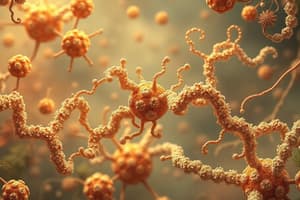Podcast
Questions and Answers
What is the primary role of enzymes in biochemical reactions?
What is the primary role of enzymes in biochemical reactions?
- Speed up reactions without being consumed (correct)
- Increase the activation energy
- Act as substrates for the reactions
- Prevent reactions from occurring
Where does the enzyme bind to the molecule undergoing the chemical reaction?
Where does the enzyme bind to the molecule undergoing the chemical reaction?
- Cytoplasm
- Extracellular space
- Nucleus
- Active site (correct)
What are enzymes classified based on?
What are enzymes classified based on?
- Their coloration in reactions
- The type of reaction they catalyze (correct)
- Their cellular origin
- Their size in molecular weight
Which type of molecule can also act as enzymes, in addition to proteins?
Which type of molecule can also act as enzymes, in addition to proteins?
Where do extracellular enzymes function?
Where do extracellular enzymes function?
What do enzymes do to the activation energy needed for a chemical reaction?
What do enzymes do to the activation energy needed for a chemical reaction?
Flashcards are hidden until you start studying
Study Notes
Enzymes are biological catalysts that play a crucial role in various biochemical reactions in living organisms. They speed up these reactions without being consumed themselves, allowing for the efficient functioning of cells and tissues. Enzymes are often proteins, although some RNA molecules can also act as enzymes, known as ribozymes. They perform their catalytic function by lowering the activation energy required for a chemical reaction to occur, thereby increasing the reaction rate. The active site of an enzyme is the region where the enzyme binds to the substrate, the molecule undergoing the chemical reaction. This interaction between the enzyme and substrate facilitates the reaction, leading to the formation of the product.
Enzymes are not only involved in biological processes within cells, but they can also be extracted from cells and used in a wide range of commercial applications, such as the production of sweetening agents, the modification of antibiotics, and in cleaning products. Some enzymes are intracellular, meaning they remain within the cell, while others are extracellular and released into the surrounding environment. The majority of enzymes in industrial use are extracellular proteins, while those for non-industrial use are intracellular and produced in smaller amounts by the cell.
Enzymes are classified based on the type of reaction they catalyze, such as oxidoreductases, transferases, hydrolases, lyases, ligases, and isomerases. Each type of enzyme plays a specific role in maintaining the proper functioning of the body, from metabolism and DNA replication to muscle and nerve function. Enzyme activity is dependent on factors such as pH, temperature, and the presence of cofactors or inhibitors.
In summary, enzymes are essential biological catalysts that play a vital role in various biochemical reactions within living organisms. They facilitate these reactions by lowering the activation energy required for them to occur, ensuring the efficient operation of cells and tissues. Enzymes can also be harnessed for a wide range of commercial applications, making them indispensable in both biological and industrial contexts.
Studying That Suits You
Use AI to generate personalized quizzes and flashcards to suit your learning preferences.




